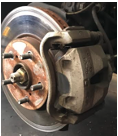 A car’s main job is to get you from point A to point B as quickly, safely and as comfortably as possible. Just as much as getting to your destination quickly is important, so is the ability to stop when you get there or if something gets in your way. You constantly must be mindful of all the things on the road: fellow drivers, people, animals and other dangers that may appear. That’s where your brakes come in. The brakes in your car are what allow the wheels on your car to stop whenever you hit the brake pedal. What many don’t know is how the brake system actually works nor about the different types of braking systems that exist.
A car’s main job is to get you from point A to point B as quickly, safely and as comfortably as possible. Just as much as getting to your destination quickly is important, so is the ability to stop when you get there or if something gets in your way. You constantly must be mindful of all the things on the road: fellow drivers, people, animals and other dangers that may appear. That’s where your brakes come in. The brakes in your car are what allow the wheels on your car to stop whenever you hit the brake pedal. What many don’t know is how the brake system actually works nor about the different types of braking systems that exist.
Just like any machine the braking system in a car has multiple parts that allow this complicated system to function properly. Each of these parts play a role in making sure that you can slow and stop your car in any situation. What are these key components you speak of?
Brake Rotor/Disc
The brake rotor is what feels the pressure from the brakes on a disc braking car. Th discs are attached to the wheel and move with it. When you press your foot against the brake pedal, that causes the brake pads on your car to squeeze the disc and force wheels to halt.
Brake Pads
The brake pads are what apply the pressure onto the brake discs and cause them to slow down. Once you press on the brake pedal the pads will squeeze the discs, applying frictional force. Many times, when you hear a squeal or grinding sound that means that your brake pads need to be changed as brake pads slowly wear down over time.
Brake Shoes
Brake shoes are not common or used at all in recent cars. They have the same role as the brake pads, however, work a bit differently. The brake shoes are attached to the axle inside a drum that can expand and contract. Once you press your brake the shoes will expand to slow down the car.
Brake Drums
The brake drums are what feel the friction from brake shoes. Overtime they’ll begin to wear down from the constant friction of the shoes. At which point, you’ll need to replace them similarly to brake pads.
Brake Caliper
The brake caliper is what holds the brake pads close to the brake rotor. They’re often visible behind all 4 wheels of your car. There are pistons inside the brake caliper that contain oil and push the brake pads against the rotor.
Brake Booster
The brake booster does exactly what it sounds like, it boosts the brakes. Located between your brake pedal and the master cylinder, it uses air from a vacuum in the engine to increase the strength felt on the brakes when you press the brake pedal. However, since it needs vacuum to work, that means that you’ll have a hard time using them when the engine is off.
Master Cylinder
The master cylinder is the main bay for all the brake fluid to be distributed to each wheel. It’s located near the end of your brake pedals and is responsible for sending all the brake fluid and pressure from the brake booster to each wheel. This allows you to brake.
Wheel Cylinders
Cars use brake calipers to squeeze the brake pads against the rotor. However, brake drums use a different type of cylinder to stop your wheels. In this case, when receiving pressure from the master cylinder, they have two sides that will expand and press against the brake.
We are happy to check your vehicle to make sure that your brakes are in tip top shape. Schedule your appointment today!